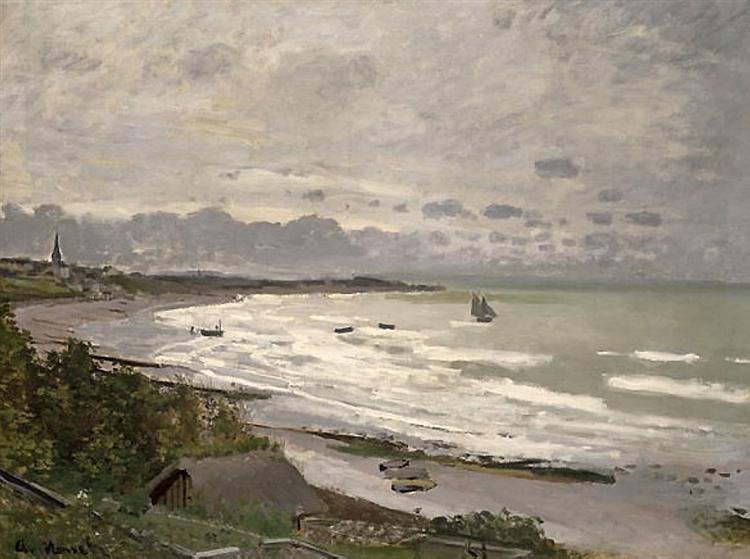Popis
Práce „pláž Saint-Adresse“ od Claude Monet, namalovaná v roce 1876, je postavena jako svědectví o přechodném procesu přechodu mistr Impresionista vůči stylu, který zachycuje vznešené světlo a atmosféru. Nachází se na pobřeží Normana a je tento obraz živým odrazem francouzské plážové atmosféry, místo, které Monet dobře věděl a které několikrát navštívilo. Obrázek nám ukazuje denní scénu letního života, poznamenanou zářivou svítivostí a přístupem k interakci mezi přírodou a lidskou postavou.
Složení práce je vyvážené, s širokou perspektivou, která zve vzhled na cestu po pláži, moři a obloze. V popředí se lidské postavy v písku stávají ohniskem, což představuje muže a ženy, kteří mají den volného dne. Monet používá pulzující barevnou paletu, kde oceánské blues najdou měkké béžové a zlaté tóny písku. Prvky flóry na levé straně přidávají nádech symetrie a dávají pocit přirozeného prostředí, které zve diváka, aby vstoupil na scénu.
Jedním z nejvýznamnějších aspektů tohoto obrazu je to, jak se Monetovi podaří zachytit sluneční světlo, které je refrakční ve vodě, což vytváří téměř éterický efekt. Technika volného a gestického štětcem, která používá, přispívá k vnímání pohybu, což odráží houpání vln. Tento přístup je v souladu s principy impresionismu, kde se účinek světla a atmosféry stává podstatou malby nad pouhou reprezentací reality. V "The Beach of Saint-Adresse", Monet nehledá fotografickou přesnost, ale emocionální a smyslovou interpretaci krajiny.
Postavy v práci, ačkoli to nejsou specifické portréty, představují mikrokosmos společnosti té doby. Šaty s dobovými plavky, prvky tradičního oblečení kontrastují se svobodou navrženou pobřežní scénou. Tato interakce každodenního života také odráží ducha té doby, éru sociálních změn a nové způsoby života, kde se začaly být součástí buržoazní kultury na pláži.
Je zajímavé poznamenat, že tato práce byla prováděna v období umělecké zralosti Monetu, kde již začala zkoumat základní charakteristiky impresionismu. Kromě toho je „Saint-Adresse Beach“ jedním z mála děl, která Monet maluje, když byl na pobřeží, ve své kariéře označil milník a symbolizuje důležitost námořní krajiny ve svém repertoáru. Obraz byl vystaven v hale z roku 1877, který pomohl založit Monet jako jednoho z hlavních umělců své doby.
Prostřednictvím „Saint-Adresse Beach“ se umělecké i sociální vlivy Monet projevují, což z něj činí práci, která zapouzdřuje nejen jeho technické schopnosti, ale také schopnost odrážet obavy své doby. Díky inovativnímu použití světla a barvy spolu s pulzujícím životem pláže činí tento obraz základním pilířem impresionismu a rezonuje s divákem ještě více než století po jeho vytvoření.
KUADROS ©, slavná barva na vaší zdi.
Ručně vyráběné olejomalby s kvalitou profesionálních umělců a výraznou pečetí KUADROS ©.
Obrázky reprodukční služba se zárukou spokojenosti. Pokud nejste zcela spokojeni s replikou vašeho obrazu, vrátíme vaše peníze 100%.

